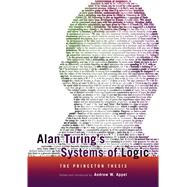Alan Turing's Systems of Logic
, by Appel, Andrew W.- ISBN: 9780691155746 | 0691155747
- Cover: Hardcover
- Copyright: 5/7/2012
Between inventing the concept of a universal computer in 1936 and breaking the German Enigma code during World War II, Alan Turing (1912-1954), the British founder of computer science and artificial intelligence, came to Princeton University to do a PhD on mathematical logic. Some of the greatest logicians in the world--including Alonzo Church, Kurt Gdel, John von Neumann, and Stephen Kleene--were at Princeton in the 1930s, and they were working on ideas that would lay the groundwork for what would become known as computer science. Though less well known than his other work, Turing's 1938 Princeton thesis, "Systems of Logic Based on Ordinals," which includes his notion of an oracle machine, has had a lasting influence on computer science and mathematics. This book presents a facsimile of the original typescript of the thesis along with essays by Andrew Appel and Solomon Feferman that explain its still-unfolding significance. A work of philosophy as well as mathematics, Turing's thesis envisions a practical goal--a logical system to formalize mathematical proofs so they can be checked mechanically. If every step of a theorem could be verified mechanically, the burden on intuition would be limited to the axioms. Turing's point, as Appel writes, is that "mathematical reasoning can be done, and should be done, in mechanizable formal logic." Turing's vision of "constructive systems of logic for practical use" has become reality: in the twenty-first century, automated "formal methods" are now routine. Presented here in its original form, this fascinating thesis is one of the key documents in the history of mathematics and computer science.







